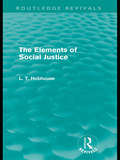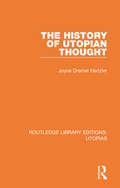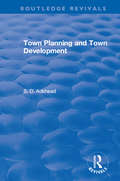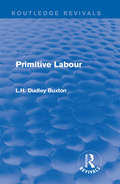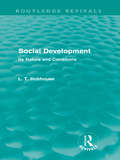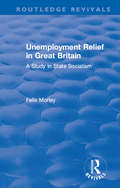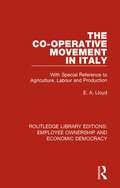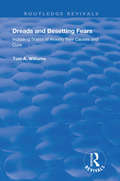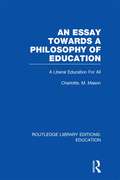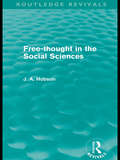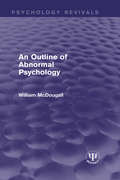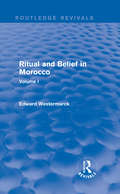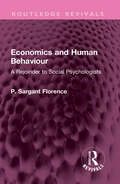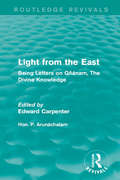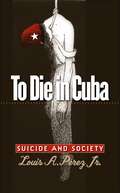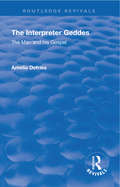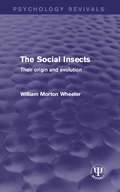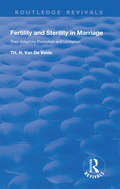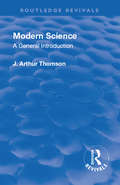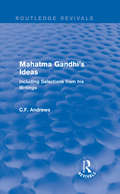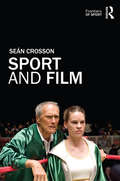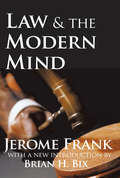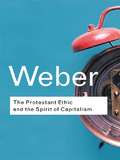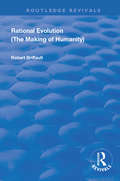- Table View
- List View
The Elements of Social Justice (Routledge Revivals)
by L. T. HobhouseFirst published in 1922, this title written by L. T. Hobhouse, British politician and one of the leading theorists of Social Liberalism, is a seminal work concerning the social application of ethical principles for the common good. The object of the book is to show that social and political institutions are not ends in themselves. Hobhouse argues that the social ideal is to be sought not in the faultless unchanging system of an institutional Utopia, but in the love of a spiritual life with its unfailing system of harmonious growth unconfined.
The History of Utopian Thought (Routledge Library Editions: Utopias)
by Joyce Oramel HertzlerThis book, originally published in 1923, embodies two related and yet distinct types of sociological endeavour. It is a study in the history of social thought, a field which had only been receiving serious and widespread attention in recent years, and attempts to give an historical cross-section of representative Utopian thought at the time. But it is also a study in social idealism, a study in the origin, selection and potency of those social ideas and ideals that occasional and usually exceptional men conceive, with particular emphasis upon their relation to social progress. It was the first book that attempted to give an unprejudiced, systematic treatment of the social Utopias as a whole.
Revival: Town Planning and Town Development (Routledge Revivals)
by S. D. AdsheadSince the passing of the Housing, Town Planning, etc, Act, 1909, there have been published a considerable number of books and a vast number of pamphlets and magazine articles dealing with the subject of Town Planning. There has, however, been produced nothing that can be described as a text-book for the student." A detailed study, including the sociological basis of town planning, traffic requirments & roads, zoning, town planning, municipal planning, and early housing acts, later acts, and more."
Primitive Labour (Routledge Revivals)
by L.H. Dudley BuxtonOriginally published in 1924, Dudley Buxton explores the evolution of primitive societies in relation to labour. This is mostly done by studying primitive inventions to try and understand how each of these inventions was used to contribute to everyday living and to develop the society’s material culture. This study places an emphasis on understanding the importance of various industrial tools to societies in relation to different industries and geographical factors such as climate. This title will be of interest to students of Anthropology.
Social Development: Its Nature and Conditions (Routledge Revivals)
by L. T. HobhouseOriginally published in 1924, Professor Hobhouse's theories and commentaries upon social development are an important milestone in the history of sociological thought. Of particular interest to the modern sociologist is his delineation of the struggle of the human mind towards rationality in thought and action and his insistence on the principle that in all social investigations it is necessary to distinguish between questions of fact and questions of value.
Unemployment Relief in Great Britain: A Study in State Socialism (Routledge Revivals)
by Felix MorleyOriginally published in 1924, Unemployment Relief in Great Britain takes up the history of unemployment relief in Great Britain, focusing on the after effects of the post-war period and the Great Depression. Primarily, the book provides a detailed study of England’s experience with compulsory unemployment insurance and public employment exchanges. The book provides an intriguing study that will appeal to sociologists and historians alike, adeptly weaving practical aspects of the insurance acts, and the administration of employment exchanges.
The Co-operative Movement in Italy: With Special Reference to Agriculture, Labour and Production (Routledge Library Editions: Employee Ownership and Economic Democracy #4)
by E. A. LloydThis title, originally published in 1925, provides a scientific exploration of some of the forms of co-operative organisation which had attained considerable development in other countries, but were little known to English students of the movement. This account of the co-operative movement in Italy will be of interest to students of economic democracy and economic history.
Dreads and Besetting Fears: Including States of Anxiety their Causes and Cure (Routledge Revivals)
by Tom A. WilliamsFirst published in 1925, this forward-thinking volume examined states of anxiety, their causes and their possible cures. Based on physicians’ reports of their patients, the author aimed to expand beyond purely obsessive dreads to understanding fear in both its determinants and its mechanisms, with the view that pathological timidity is only brought on through learned fear and environmental influences rather than from birth.
An Essay Towards A Philosophy of Education: A Liberal Education for All (Routledge Library Editions: Education)
by Charlotte M MasonThis was the last and most important and comprehensive work of Charlotte Mason, (founder of the Parents’ National Educational Union). For more than half a century the practical results of her original thought on education could be seen in all parts of the world in the Charlotte Mason Method and the Parents’ Union Schools.
Free-Thought in the Social Sciences (Routledge Revivals)
by J. A. HobsonThis Routledge Revival sees the reissue of a seminal work by British economist, sociologist and academic John A. Hobson, elucidating his views on a variety of topics across the social sciences. He makes particular reference to the struggle between the disinterested urge of the social scientist and the interests and other motive forces which tend to influence and mould his processes of inquiry. The work is split into three parts, focussing upon free-thinking, economics and political ethics respectively.
An Outline of Abnormal Psychology (Psychology Revivals)
by William McDougallOriginally published in 1926, a complement to the author’s Outline of Psychology, this book surveys the field of neurotic and mental disorders in so far as they are not due to gross organic lesions. It discusses this principal types of mental process that are abnormal or disorderly in the sense that they are departures from the fully waking processes of the normal mind, seeking to understand them in terms of the general principles laid down in the earlier volume. Sleep, the influence of drugs and suggestion, conflict and repression, automatisms and somnambulisms, morbid fears, obsessions and impulsions, perversions, delusions, exaltation and depression, multiple personalities, psycho-therapy, and the schools of abnormal psychology – these and many others are the topics discussed from the point of view, not of medical practice, but of psychological theory. A book, not for the medical expert only, but for every man or woman interested in the riddle of human personality.
Ritual and Belief in Morocco: Vol. I (Routledge Revivals)
by Edward WestermarckBetween the years of 1898 and 1926, Edward Westermarck spent a total of seven years in Morocco, visiting towns and tribes in different parts of the country, meeting local people and learning about their language and culture; his findings are noted in this two-volume set, first published in 1926. Alongside extensive reference material, including Westermarck’s system of transliteration and a comprehensive list of the tribes and districts mentioned in the text, the chapters discuss such areas as the influences on and relationship between religion and magic in Morocco, the origins of beliefs and practices, curses and witchcraft. This is the first volume of two dealing with the same subject, and will fascinate any student or researcher of anthropology with an interest in the history of ritual, culture and religion in Morocco.
Economics and Human Behaviour: A Rejoinder to Social Psychologists (Routledge Revivals)
by Philip Sargant FlorenceFirst published in 1927, Economics and Human Behaviour is a defence of orthodox economics against the attacks of social psychology. The author has explicated on the characteristics and value of both orthodox economics as well as psychology, and then presented psychology’s criticism against orthodox economics. Before concluding with the limitations of both disciplines, this tiny book reinstates the importance of orthodox economics in the gathering and interpretation of facts. Given the predominance of economics over psychology in current times, this book will be an interesting read for anyone keen on imagining the tables turned. It will also appeal to students of economics, history and psychology.
Light from the East: Being Letters on Gñanam, The Divine Knowledge (Routledge Revivals: The Collected Works of Edward Carpenter)
by Hon. P. ArunáchalamLight from the East collates letters between Hon. P. Arunáchalam of the legislative council of Ceylon and Edward Carpenter, which expand on issues of the Gñanam or divine knowledge. Carpenter edited these letters for publication in 1927 as well as writing additional articles on issues such as desire, birth control and bisexuality in relation to the customs of Ceylon and religious laws of Hinduism to give the reader a broad insight into the religion. This title will be of interest to students of sociology, anthropology and religious studies.
To Die in Cuba
by Louis A. PérezFor much of the nineteenth century and all of the twentieth, the per capita rate of suicide in Cuba was the highest in Latin America and among the highest in the world--a condition made all the more extraordinary in light of Cuba's historic ties to the Catholic church. In this richly illustrated social and cultural history of suicide in Cuba, Louis A. Perez Jr. explores the way suicide passed from the unthinkable to the unremarkable in Cuban society.In a study that spans the experiences of enslaved Africans and indentured Chinese in the colony, nationalists of the twentieth-century republic, and emigrants from Cuba to Florida following the 1959 revolution, Perez finds that the act of suicide was loaded with meanings that changed over time. Analyzing the social context of suicide, he argues that in addition to confirming despair, suicide sometimes served as a way to consecrate patriotism, affirm personal agency, or protest injustice. The act was often seen by suicidal persons and their contemporaries as an entirely reasonable response to circumstances of affliction, whether economic, political, or social.Bringing an important historical perspective to the study of suicide, Perez offers a valuable new understanding of the strategies with which vast numbers of people made their way through life--if only to choose to end it. To Die in Cuba ultimately tells as much about Cubans' lives, culture, and society as it does about their self-inflicted deaths.For much of the nineteenth century and all of the twentieth, the per capita rate of suicide in Cuba was the highest in Latin America and among the highest in the world--a condition made all the more extraordinary in light of Cuba's historic ties to the Catholic church. In this richly illustrated social and cultural history of suicide in Cuba, Louis A. Perez Jr. explores the way suicide passed from the unthinkable to the unremarkable in Cuban society. To Die in Cuba ultimately tells as much about Cubans' lives, culture, and society as it does about their self-inflicted deaths.-->
Revival: The Man and His Gospel (Routledge Revivals)
by Amelia DefriesFrom Book’s Foreward What so strongly attracted me in Patrick Geddes when I came to know him in India was, not his scientific achievements, but, on the contrary, the rare fact of the fullness of his personality rising far above his science. Whatever subjects he has studies and mastered have become vitally one with his humanity. He has the precision of the scientist and the vision of the prophet; and at the same time, the power of the artist to make his ideas visible through the language of symbols. His love of Man has given him the insight to see the truth of Man, and his imagination to realize in the world the infinite mystery of life and not merely its mechanical aspect.
The Social Insects: Their Origin and Evolution (Psychology Revivals)
by William Morton WheelerOriginally published in 1928, this volume, by a world authority on the subject, sums up our knowledge of the social insects. It inquires what are the social insects and what it is that makes us call them ‘social’. Terebrantia, aculeata, wasps, bees, ants, and termites are discussed in a succession of chapters, showing how they have evolved, to how great an extent they have developed, and what are the peculiarities of their evolution. Polymorphism, the Social Medium, Guests and Parasites of the Social Insects, are other subjects discussed in this fascinating book.
Revival: Their Voluntary Promotion and Limitation (Routledge Revivals)
by Theodoor Hendrik van de VeldeIn this work the eminent Dutch physician offers for the intelligent layman as well as for doctors, psychologists, teachers and social workers a guide to the causes and effects of fertility and sterility. This book is the third and last volume in Dr Theodoor Hendrik van de Velde’s trilogy on the problems of marriage and this book completes his internationally authoritative work on eugenics and volitional sex behavior. Following his other book Ideal Marriage and Sexual Tensions in Marriage, this book considers such problems as sexual abstinence and excess, family limitation, the achievement of desired pregnancy, the causes and consequences, physically and emotionally, and sterility in women and impotence in men, artificial insemination, and the delicate personal and social aspects of undesired conception. Scientific in its approach and simple in its presentation, this book is for doctors and laymen. It offers information that contributes to a healthier understanding of voluntary and planned conception and helps safeguard happiness in marriage.
Revival: Modern Science (Routledge Revivals)
by J. Arthur ThomsonThe aim of this book is to give a general idea of the way in which Modern Science looks out on the world. By selecting a few salient illustrations, it seeks to show how the various sciences are disclosing the Order of Nature. It is hoped that it may be of service to the able minded reader who wishes an introduction of an informal type to the chief scientific problems of today. The book is meant to be suggestive as well as informative; and two characteristic features may be noted, for they are deliberate: the illustrations of scientific progress that have been selected are taken from all the great orders of facts – from astronomy to anthropology; and they deal not with easy things, but with the big problems that matter most.
Routledge Revivals (1929): Including Selections from his Writings
by C.F. AndrewsFirst published in 1929, this book was intended to explain, "with documentary evidence", the main principles and ideas for which Gandhi had stood over the course of his career up until that point. The author draws upon his long and intimate personal relationship with Gandhi to give an authoritative and individual account of a man whose politics and philosophy has invited continuing analysis — extended with illustrative selections from his speeches and writings. The context in which Gandhi’s ideas were formed and developed provides the focus for this book with the first part examining the religious environment and the second the historical setting.
Sport and Film (Frontiers of Sport)
by Seán CrossonThe sports film has become one of commercial cinema's most recognizable genres. From classic boxing films such as Raging Bull (1980) to soccer-themed box-office successes like Bend it Like Beckham (2002), the sports film stands at the interface of two of our most important cultural forms. This book examines the social, historical and ideological significance of representations of sport in film internationally, an essential guide for all students and enthusiasts of sport, film, media and culture. Sport and Film traces the history of the sports film, from the beginnings of cinema in the 1890s, its consolidation as a distinct fiction genre in the mid 1920s in Hollywood films such as Harold Lloyd’s The Freshman (1925), to its contemporary manifestation in Oscar-winning films such as Million Dollar Baby (2004) and The Fighter (2010). Drawing on an extensive range of films as source material, the book explores key issues in the study of sport, film and wider society, including race, social class, gender and the legacy of 9/11. It also offers an invaluable guide to 'reading' a film, to help students fully engage with their source material. Comprehensive, authoritative and accessible, this book is an important addition to the literature in both film and media studies, sport studies and cultural studies more generally.
High Ideals and Noble Intentions
by Peter R. ElsonThe relationships between governments and the voluntary sector in Canada are long-standing and complex. Beginning with an historical overview of developments in voluntary sector-government relations from 1600 to 1930, High Ideals and Noble Intentions goes on to explore more recent events and to bring present day policy and practice into focus.Peter R. Elson examines critical historical events in the relationship between the federal government and the voluntary sector which continue to exert their influence. He demonstrates through in-depth case studies that these events are critical to understanding contemporary voluntary sector-government relations. Elson explores the impact of the regulation of charities based on amendments to the 1930 Income War Tax Act; the shift from citizen-based program funding to service-based contract funding in the mid-1990s; and advocacy regulation changes in the 1980s. Elson's case is strengthened by an important and timely comparison between voluntary sector and central government relations in Canada and England. This historically informed comparative analysis provides the basis for practical recommendations meant to improve the future of voluntary sector-government relations across Canada.
Law and the Modern Mind
by Jerome Frank Brian H. BixLaw and the Modern Mind first appeared in 1930 when, in the words of Judge Charles E. Clark, it "fell like a bomb on the legal world." In the generations since, its influence has grown-today it is accepted as a classic of general jurisprudence.The work is a bold and persuasive attack on the delusion that the law is a bastion of predictable and logical action. Jerome Frank's controversial thesis is that the decisions made by judge and jury are determined to an enormous extent by powerful, concealed, and highly idiosyncratic psychological prejudices that these decision-makers bring to the courtroom.
The Protestant Ethic and the Spirit of Capitalism (Routledge Classics)
by Max WeberMax Weber's best-known and most controversial work, The Protestant Ethic and the Spirit of Capitalism, first published in 1904, remains to this day a powerful and fascinating read. Weber's highly accessible style is just one of many reasons for his continuing popularity. The book contends that the Protestant ethic made possible and encouraged the development of capitalism in the West. Widely considered as the most informed work ever written on the social effects of advanced capitalism, The Protestant Ethic and the Spirit of Capitalism holds its own as one of the most significant books of the twentieth century. The book is one of those rare works of scholarship which no informed citizen can afford to ignore.
Rational Evolution: The Making of Humanity (Routledge Revivals)
by Robert BriffaultPublished in 1919: The author discusses the development of Humanity from Evolution to Civilisation to the birth of Nations and European Liberations.
